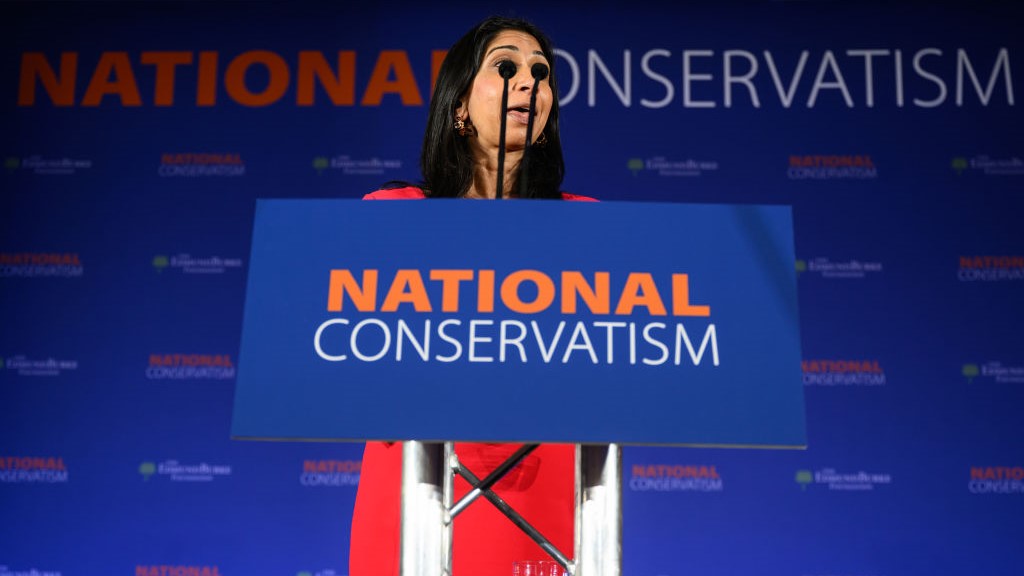I was glad to see that Martin Fletcher did not fall into the trap of describing the National Conservatism conference as a motley gathering of laughable eccentrics whose ravings can be easily discounted (“A party right on the edge”, TNE #342). Ukip were never taken seriously, and look what damage they managed to inflict upon Britain in their brief, media-assisted moment in the sun.
Fletcher is right to say that the Nat Cs’s agenda is unlikely to decide the next election, as the impact of the cost-of-living crisis continues to unfold. But with so many of the right’s core beliefs unravelling – who really believes in Brexit, trickle-down economics and deregulation now? – the myths about “woke” peddled at this conference will be with us for years.
In the hands of someone less wonky, traditional and (I know many will disagree with this last bit) honest than Rishi Sunak, they could even return the Conservatives to power in 2030.
Daniel Brewis
Ironic that the “evangelical Christians” mentioned in Martin Fletcher’s excellent analysis of the recent National Conservatism conference seem to have forgotten that they worship a homeless Jewish rabbi, a refugee, who spoke Aramaic, was frequently homeless, lived his life in poverty, and preached forgiveness, tolerance, and loving one’s neighbour.
Carol Hedges
Harpenden, Herts
I saw headmistress Katharine Birbalsingh’s bizarre “hold the line” speech at the National Conservatism conference, in which she said she regularly played clips from Gladiator to her staff and claimed that we are about to “lose our country”. What a cesspit this conference really was.
Robert Edwards
Via Facebook
If they’d had any sense they’d have called it National Salvation and invited figures like Paul Embery, John Mann and Ian Austin to give it an air of respectability with the “Blue Labour” right wing voter. It would have been far more interesting.
Em Jackson
Ducking out
The key paragraph in James Ball’s “Useless duckers” (TNE #342) is: “Then Liz Truss attempted to deliver the post-Brexit economy Farage has been talking up for years – deregulation, small state, low-tax libertarianism. It exploded on contact with reality.”
I would imagine Farage is unrepentant about his advocacy of that kind of “Brexit delivery”. If it “exploded on contact with reality”, then no doubt he would say that reality is to blame.
Tony Stopyra
Via Facebook
Call me rave
In his interview with Tim Martin (“Bregrets? He might have a few”, TNE #342), Jonty Bloom writes that “David Cameron ran an appallingly bad campaign in which his ‘friends’ ran rings around him”.
It was Cameron’s booklet through my letterbox which convinced me that Remain was the best option. I’ve still got the booklet, it’s my bit of gold dust. Everything printed in it has come true.
Sue Whitbread
Gone amiss
Will Self’s adulation of Martin Amis’ strictures on “which” and “that” is misplaced. If Mart had bothered to check the grammars and Oxford English Dictionary housed in the University of Manchester’s main library, the John Rylands Library on Oxford Road, he would have seen that both “which” and “that” are widely used in the construction which he cites, and have been for centuries.
Objecting to the use of either one is groundless prescriptivism, as they should know. Usage is defined by consensus. I had never had either man down as creatures of the prescriptivist establishment. Or does Will secretly hanker for a home on the opinion pages of the Torygraph?
(Prof) Anthony Grant
Edge Hill University, Ormskirk, Lancs
Smartin’
The emperor with no clothes, aka Martin Scorsese, has paraded in front of Jason Solomons at Cannes and been called the “Greatest living American film-maker” (“Ballads of the Betrayed”, TNE #342). Giving him top billing over such luminaries as Anderson, Burton, Coppola to Zemeckis is a highly dubious claim.
It’s no surprise Scorsese’s new film, Killers of the Flower Moon, is 206 minutes long as he’s a director with no idea when to cut a scene or a film. His back catalogue is endless because of the length of celluloid involved. Aside from his documentaries, his obsession with themes of brutality, manipulation, murder and male control puts him top of a list of least enjoyable filmmakers.
Hugh Janes
Plymouth, Devon
Businesslite
Benedict Marshall says Keir Starmer is rebranding Labour as “business friendly” (Letters, TNE #342). The harsh reality is that anything truly “business friendly” would involve Rejoin as soon as possible.
Don Adamson
Bradford, West Yorkshire
It’s all overs
Gregor Thompson’s “Stumped by falling for a canard d’or” (TNE #342) reminded me that in Spain, too, there is no understanding of that quintessential game of cricket.
My son and family live in Mallorca and he set up a cricket team for children last year, as my grandsons are cricket mad. They eventually had a little tournament against mainland expat children. This year the three Balearic Islands had an adult competition. Mallorca beat Ibiza but lost to Menorca. Not bad for a team without a ground and nowhere to play!
I do so enjoy TNE.
Jan Peskett
Sorry sight
In the last issue of TNE (#342) you printed large photographs of Jacob Rees-Mogg, Boris Johnson and Nigel Farage. If you plan to do this again in future, people of a nervous disposition might appreciate some kind of advance warning.
Alan Clark
Borrowash, Derbyshire
Turkey’s truth
Your articles on Turkey (TNE #341, 340) are just an attempt to discredit Recep Tayyip Erdoğan. Stop calling him authoritarian; Turkey is more democratic than the US.
You are fooling yourselves. The EU wants a weak president so it can control him while pursuing its own interests. Ask yourself this: why is Erdoğan more popular in Africa than Emmanuel Macron?
Ibrahim M
Down to zero
In “What’s the point of Starmer if he won’t confront Braverman?” (TNE #341), Matthew d’Ancona tells us at length how dreadful the home secretary and her colleagues are, but completely misses the point.
There are perfectly good reasons why decent and reasonable people also agree with her objectives, even if not with all of the means she proposes for reaching them, and still less with various of her motives. In essence, there are very good grounds for objecting to net immigration that have absolutely nothing to do with, and are quite distinct from, objecting to immigrants as such.
We are already an overcrowded small island, in global terms, and to suppose that we can continue indefinitely with a policy of large positive net immigration is to live in cloud cuckoo land. The south-east cannot take any significant numbers of new occupants. It is grossly congested, and its water resources are strained beyond their limits. Climate change is likely to make this even worse.
New occupants must have not only (non-existent) housing, but increases in all the infrastructure that communities need: schools, doctors and hospitals, police, public transport, and so on. Where are these to come from, who is to pay for them, and for whose benefit?
Multiple studies may show that immigration encourages growth in GDP: it would be amazing if they didn’t. But they do not show any growth in GDP per person, which is the only sort that is beneficial.
Matthew is welcome to argue for as much immigration as he wants but, given where we are, we should be aiming to reduce net immigration down to zero as quickly as we can.
In the meantime, we should only be accepting a positive net migration figure if we have previously identified – and agreed on – where the extra numbers will be housed, and how and why all those public services they will be needing are to be provided and paid for.
Richard Burnett-Hall
London W11
PR will work!
I have to take issue with James Ball’s article “PR won’t kill the Tories” (TNE #341). Progressives want to replace first past the post not because proportional representation would keep right wingers out of power altogether, but because FPTP has given the Tories 13 years of unearned, undeserved and disastrous power.
PR is not perfect, but it is a great deal less problematic than the awful FPTP we now have that hands huge parliamentary majorities to the right on a minority of the vote and has disenfranchised me my entire life.
As to the objection that proportional representation systems can be dominated by very small extreme parties holding the balance of power, that can be dealt with by insisting that a party has to get a minimum share of the vote to have any MPs, as already happens in New Zealand. FPTP has already given us a far right party in the shape of the current Tory government in any case.
Alexander Blackburn
Hemel Hempstead, Herts
PR might not “kill the Tories” as James Ball ponders, but it would probably reduce the dominance they have achieved. Tory-dominated governments have been elected two-thirds of the time in the last century – but were elected under half the time in the previous century.
In that era, with Tories v Whigs, and later v Liberals, Britain had an increasingly clear-cut two-party system, served unproblematically by FPTP.
But since then, we (and especially England) have had a two-and-a-half party system, which FPTP badly distorts.
Anthony Thacker
Hinckley
Hole picture
Jonty Bloom is too pessimistic about options available to the next government to fund the £220bn he says must be invested to solve the UK’s crises (“Britain’s £220bn black hole”, TNE #341).
Tax rises should be couched in terms of meeting the public’s desire for a fairer taxation system, where the wealthier contribute far more.
In terms of borrowing, the emphasis should be on personal savers and pension funds. Change the rules on Isas so that some of the £70bn saved annually can be invested in government-backed social or green bonds at a competitive interest rate. Tax relief on pension contributions costs £54bn a year at present, so 25% of all contributions could be directed to investments in such bonds, making more than £25bn available. A much-needed example of intergenerational solidarity.
Finally, he fails to mention the money-creation ability of the government should there be any shortfall in the more than £200bn per year needed. During the banking crisis of 2008-09 and Covid-19 in 2020, more than £875bn of government-created money via quantitative easing (QE) twice saved the economy. QE could therefore be another funding source to help rebuild Broken Britain’s infrastructure, a national emergency if ever there was one.
Colin Hines
East Twickenham, Middlesex



